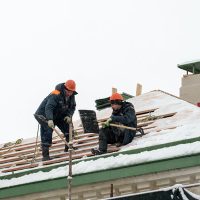Workers’ Compensation Benefits For Winter Accidents

Winter is upon us and for many workers, it means slips and falls and possibly even hypothermia. These dangers can lead to broken bones, medical issues, and even death.
You may not think winter workplace accidents are common—after all, they’re not commonly talked about—but they are, especially in New York. In 2017, ice and snow contributed to 20,000 workplace injuries. Of those, 2,890 (14%) occurred in New York.
Those who work in industries such as construction, fishing, agriculture, and recreation face the highest risk of winter weather exposure. First responders, snow cleanup workers, and freezer storage workers also face a high risk.
What Types of Accidents Can Happen?
The most common winter accident is slips and falls. They account for 20% of workplace accidents as well as 15% of deaths. Only motor vehicle crashes are more deadly.
Construction workers and others who work with heights face an increased risk of accidents in the winter. This is especially true on snow- or ice-covered roofs, where a worker can slip or fall through. A fall at such a height can result in broken bones, head trauma, and even death. In fact, in the construction industry, falls are the top cause of fatality.
Snow removal equipment and power lines also pose dangers. Equipment can malfunction and crush employees, while power lines can cause electrocution.
Cold stress and exposure are also concerns for those who work outdoors. Being outside in freezing cold temperatures for a long duration can cause tissue damage and other medical conditions. Frostbite, hypothermia, and trench foot are common concerns. Another medical issue that’s not well-known but painful is chilblains, which is characterized by inflammation of blood vessels and causes itching, pain, burning, skin ulcers, and red patches.
What Can Employers Do?
While the Occupational Safety and Health Administration (OSHA) does not have specific winter guidelines in place for workers, employers are legally mandated to ensure their employees are in a safe working environment. Employees should be trained on what to do to avoid cold weather hazards, such as temperature drops and wind advisories. It’s best to not work in cold weather at all, but if it’s necessary, time spent outdoors should be limited. Employers can also take other steps, such as scheduling work for the warmest part of the day as well as rotating staff to avoid excessive exposure.
Slips and falls are a major concern. They can be prevented by clearing walkways and working areas from ice and snow. There should be signs posted to warn others of dangerous areas that cannot be cleared right away.
Contact Us for More Information About Workers’ Compensation Benefits
Winter workplace accidents can cause serious injuries, and those who work outdoors are more susceptible. If you’re not getting the compensation you deserve, it’s important that you seek legal help.
White Plains workers’ compensation lawyer Michael Lawrence Varon has experience handling New York workers’ compensation claims. We can help you understand your options and assist you in filing a claim. To schedule a free consultation, call (914) 228-1770 or fill out the online form.
Source:
ohsonline.com/articles/2020/02/11/cold-and-winter-weatherrelated-workplace-injuries-and-tips-to-prevent-them.aspx
